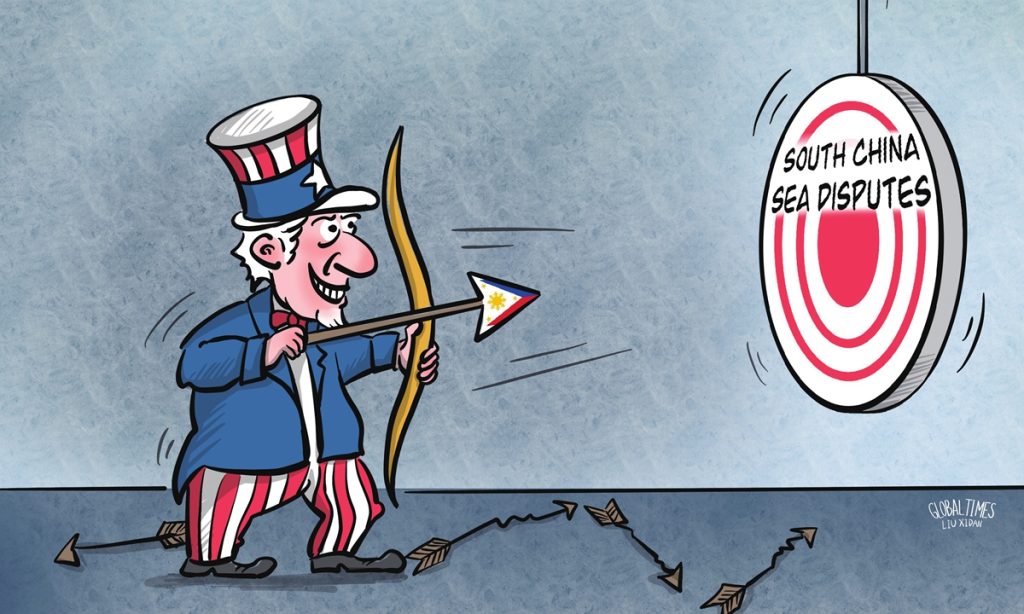Manila’s SCS aggression result of strategic error

In recent months, the Philippines has frequently provoked China in the waters surrounding Ren'ai Reef and Huangyan Island, attracting extensive international attention. Will the Philippines take the risk of relying on the support of the US to forcefully transport construction materials and personnel to the illegally "grounded" warship in Ren'ai Reef, thereby triggering an armed conflict between China and the Philippines? Although it has not been ruled out that the Philippines may take such extreme measures to further exacerbate the situation in the South China Sea and the China-Philippines relationship under the misjudgment of the situation, the probability of them taking such extreme actions is still relatively low.
Successive Philippine governments have shown periodic swings in dealing with relations with China. These swings can even occur within the same presidential term. The predecessor of former President Rodrigo Duterte,in the first four years of his presidency, distanced the Philippines from the US, reduced provocations in the South China Sea and actively participated in the Belt and Road Initiative. However, over the last two years in his presidency, the situation in the South China Sea had been tense. And he restored the Philippines' key military agreement with the US.
Since President Ferdinand Marcos Jr entered office in 2022, this trend in foreign policy is still evident. He not only became the first Philippine president to visit the White House in 10 years but also granted the US military access to four military sites. The Philippines under his leadership frequently clashed with China over the South China Sea issue. However, he also visited China in early 2023 and made a guarantee that the military bases accessible to the US would not be used in any offensive action, expressing a certain degree of goodwill toward China. Therefore, it is premature to say the Philippines will continue to antagonize China in the future based solely on its current "tough policy" in the South China Sea.
Furthermore, some domestic factions in the Philippines believe that the US would provide substantial support to the Philippines in the event of a military conflict with China. This is a serious strategic misjudgment influenced by two misleading signals. Firstly, in February 2023, the US and the Philippines expanded the Enhanced Defense Cooperation Agreement (EDCA). The Philippines agreed to allow US military presence in four new military bases, believing that the US would reciprocate and provide strong support to the Philippines in the event of a military conflict with China. Additionally, the US has expressed its intention to invite the Philippines to join its "Indo-Pacific" multilateral security cooperation mechanism, creating a new "Quadrilateral Security Mechanism" including the US, Japan, Australia and the Philippines to address potential conflicts in the South China Sea. However, the US has never publicly committed to militarily assisting or supporting the Philippines in the event of a military conflict with China. The Philippine government should abandon such illusion.
The current policy of provoking China by the Philippines is not well-received within the ASEAN. ASEAN member states hope that, amid the backdrop of the US and its allies using the Indo-Pacific Strategy to confront China, China can exercise maximum restraint, and they do not want their own countries to be used by the US as "pawns" in its efforts to contain China. Currently, the escalating provocations by the Philippines in the South China Sea do not align with the overall interests of ASEAN countries in pursuing "peace, security and stability." It is clear that the ASEAN countries will not take sides with the Philippines and will not allow the situation to escalate further.
Relevant Philippine authorities should not underestimate China's determination and capability to maintain stability in the South China Sea. Currently, Philippine authorities and Western media have been continuously engaging in attention-seeking, live-streaming provocations. Besides exposing their attempts to wage a "public opinion war" to discredit China, it further demonstrates the lack of strategic thinking by the Marcos Jr government on critical issues related to regional peace and stability, putting the Philippines' national image and national security in a perilous situation. Philippine authorities should promptly cease such meaningless sensationalism and return to the path of resolving South China Sea disputes through negotiations and dialogue with China, and by reaching the Code of Conduct in the South China Sea as soon as possible.